
Journal of Classics Teaching
Scope & Guideline
Exploring New Horizons in Classics Teaching
Introduction
Aims and Scopes
- Pedagogical Innovation in Classics Education:
The journal emphasizes new teaching methodologies and practices aimed at enhancing the engagement and effectiveness of classical education in various educational settings. - Integration of Technology in Teaching Classics:
A significant focus is placed on utilizing digital tools and resources, including online courses and interactive games, to facilitate learning of ancient languages and classical texts. - Project-Based and Experiential Learning:
The journal promotes project-based learning approaches, encouraging students to engage with classical content through hands-on activities, fostering deeper understanding and appreciation of ancient cultures. - Research on Language Acquisition:
A core area of research involves investigating effective strategies for teaching Latin and Ancient Greek, particularly focusing on vocabulary acquisition and language skills development. - Cultural and Historical Contextualization:
Papers often explore the historical and cultural implications of classical texts and artifacts, aiming to connect ancient knowledge with contemporary issues and educational practices.
Trending and Emerging
- AI and Digital Tools in Classics Education:
There is a growing emphasis on the integration of artificial intelligence and digital resources in teaching classical languages, indicating a trend towards modernizing educational practices and enhancing student engagement. - Inclusive and Accessible Classical Education:
Recent articles focus on strategies for making classical education more inclusive, addressing diverse learning needs and promoting accessibility within the curriculum. - Interdisciplinary Connections:
Emerging themes highlight the interdisciplinary nature of classical studies, with papers exploring connections between classics and subjects like history, literature, and modern languages, fostering a broader understanding of ancient cultures. - Cultural Relevance and Social Justice:
A trend towards discussing the relevance of classical education in contemporary social issues, including discussions on diversity and representation in classical studies, reveals a commitment to making the ancient world relevant to today's learners. - Experiential Learning and Community Engagement:
There is an increasing focus on experiential learning opportunities that connect students with their communities through classical education, such as local history projects and collaborative initiatives.
Declining or Waning
- Traditional Textual Analysis:
There has been a noticeable decline in papers focused solely on traditional textual criticism and analysis of classical texts without practical application, as the journal shifts towards more interactive and engaging pedagogical methods. - Historical Reenactment:
Themes centered around historical reenactments of classical events or figures have diminished, indicating a move away from purely performative approaches towards more integrative and experiential learning. - Classical Language Competitions:
Papers discussing competitions or games centered around classical languages have become less frequent, suggesting a shift towards collaborative and project-based learning experiences instead.
Similar Journals

Pegem Egitim ve Ogretim Dergisi
Pioneering Research in the Heart of EducationPegem Egitim ve Ogretim Dergisi is a prominent academic journal published by PEGEM AKAD YAYINCILIK EGITIM DANISMANLIK HIZMETLERI TIC LTD STI, specializing in the field of education. Based in Turkey, this journal offers a platform for scholarly discourse, catering to both emerging and established researchers in the educational domain. With its ISSN 2148-239X, the journal aims to provide insights into contemporary educational practices, pedagogical innovations, and research findings that influence teaching and learning. Although classified in the Q4 quartile of the education category as of 2022 and achieving a Scopus rank of 1178 out of 1469, it remains a valuable resource for practitioners and academics alike. The journal ceased Scopus coverage in 2023, yet it continues to be a relevant outlet for educational research in Turkey and beyond. While it operates under traditional access models, the potential for collaborative research and knowledge sharing makes it a noteworthy choice for those engaged in the evolving landscape of education.
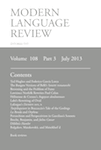
MODERN LANGUAGE REVIEW
Charting New Territories in Modern Language StudiesMODERN LANGUAGE REVIEW, published by the Modern Humanities Research Association, is a pivotal academic journal based in the United Kingdom, focusing on the fields of linguistics, literature, and literary theory. With an ISSN of 0026-7937 and an E-ISSN of 2222-4319, this journal serves as a platform for disseminating research that explores the nuances of language and its literary contexts. Although currently not an open-access publication, it provides valuable insight into a range of topics, contributing to a deeper understanding of human communication and expression. Covering a wide scope with a publication history from 2002 to 2024, the journal is indexed in Scopus and holds a Q4 ranking in both linguistics and literature categories, indicating its emerging influence within these academic disciplines. As the landscape of humanities research continues to evolve, MODERN LANGUAGE REVIEW remains a vital resource for scholars, professionals, and students aiming to engage with contemporary debates and developments in language and literature.
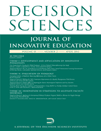
Decision Sciences-Journal of Innovative Education
Exploring the dynamics of decision sciences in modern education.Decision Sciences - Journal of Innovative Education is a prestigious academic journal published by WILEY, focusing on the intersecting fields of decision sciences, education, and management. With an ISSN of 1540-4595 and an E-ISSN of 1540-4609, this journal offers valuable insights and research findings aimed at fostering innovative educational practices and decision-making processes. As of 2023, it boasts an impressive Q2 ranking in several categories, including Business, Management and Accounting, Decision Sciences, and Education. This positions it within the top tier of journals in its field, reflecting its commitment to high-quality scholarship. Researchers and educators benefit from its extensive coverage of contemporary topics and methodologies, making it a vital resource for those seeking to enhance their understanding and application of innovative strategies in education. Although it does not currently offer open access, the journal remains accessible via institutional subscriptions, ensuring that its impactful research is readily available to a broad audience. The journal's scope spans from 2011 to 2024, allowing for a comprehensive exploration of evolving trends in decision sciences and education.

JOURNAL OF SOCIAL WORK EDUCATION
Inspiring change in the field of social work education.JOURNAL OF SOCIAL WORK EDUCATION, published by Routledge Journals, Taylor & Francis Ltd, is a premier academic journal dedicated to advancing the field of social work education through high-quality research and scholarship. With an ISSN of 1043-7797, this esteemed journal, operating from the United Kingdom, has been a vital resource since its inception in 1985. It boasts a significant impact in the academic community, categorized in 2023 as Q1 in Social Sciences (Miscellaneous) and Q2 in Education and Social Work, reflecting its commitment to excellence. The journal provides a platform for educators, researchers, and practitioners to share innovative ideas, effective teaching methods, and empirical studies, thus facilitating the continuous improvement of social work education. Although it currently does not offer open access options, the Journal of Social Work Education remains dedicated to fostering critical discourse and enriching the scholarly community with insights that are relevant to both current practices and future developments in social work.

Porta Linguarum
Unveiling the nuances of language through rigorous research.Porta Linguarum, published by UNIV GRANADA in Spain, is a pioneering journal dedicated to the fields of linguistics and language studies, with a dual focus on the educational implications and applications within these disciplines. Launched in 2008 and continuing its impactful contributions into 2024, the journal is recognized for its rigorous peer-reviewed articles that address contemporary language issues, pedagogical approaches, and linguistic research, evidenced by its notable rankings in the 2023 Scopus metrics. Porta Linguarum holds a distinguished Q1 classification in Linguistics and Language, alongside a respectable Q3 placement in Education, marking it as a valuable resource for academics and practitioners alike. With an impressive ranking of 231 out of 1088 in the Arts and Humanities category and a strong 78th percentile ranking for Language and Linguistics, this journal facilitates the exchange of innovative ideas and promotes scholarly discourse. Although currently not adopting an open access model, it remains an essential platform for advancing knowledge in linguistics and education.

Chemistry Teacher International
Innovating Teaching Strategies for Tomorrow's ChemistsChemistry Teacher International is a prominent peer-reviewed journal dedicated to the field of chemistry education, published by WALTER DE GRUYTER GMBH. With its Open Access policy since 2018, this journal ensures that research is widely disseminated to educators, researchers, and practitioners globally. Located in Berlin, Germany, it aims to promote innovative teaching methodologies and practical applications in chemical sciences. The journal has consistently achieved a Q2 ranking in both the Chemistry (Miscellaneous) and Education categories as of 2023, reflecting its relevance and impact within the academic community. Over its converged years from 2019 to 2024, Chemistry Teacher International fosters a collaborative platform for sharing research, insights, and pedagogical strategies, thereby contributing to the advancement of chemistry education on a global scale.
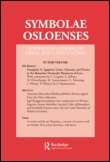
Symbolae Osloenses
Exploring the Depths of Ancient WisdomSymbolae Osloenses, published by TAYLOR & FRANCIS LTD, is a distinguished journal in the field of Classics, with a rich history dating back to its inception in 1922. This UK-based journal has continuously contributed to the scholarly discourse surrounding ancient cultures, languages, and literature, making it a crucial resource for researchers, educators, and students alike. Though it operates under a subscription model, its impact on the academic community is underscored by its recent inclusion in the 2023 Scopus rankings, where it holds a respectable position in the 65th percentile among its peers. With decades of published research spanning from 1924 to 2023, Symbolae Osloenses remains committed to fostering robust academic dialogue and advancing knowledge in the Classics, catering to a diverse readership seeking to explore the nuances of classical studies.
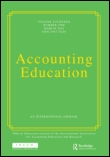
Accounting Education
Innovating Teaching Practices in Accounting DisciplinesAccounting Education is a leading academic journal dedicated to advancing the field of accounting education, published by Routledge Journals, Taylor & Francis Ltd. With an impressive Q1 ranking in both the fields of Accounting and Education, the journal serves as a vital platform for educators, researchers, and practitioners interested in the evolving pedagogies and methodologies in accounting education. The journal’s focus is on disseminating high-quality research that addresses contemporary challenges and innovations within accounting teaching, supported by an extensive archive from 1992 to the present. While currently not open access, the journal is known for its rigorous peer-review process, ensuring that only the most impactful research is published. With its high Scopus rankings, including a notable 92nd percentile in Business, Management and Accounting, Accounting Education provides invaluable insights and fosters professional development, making it an essential resource for anyone committed to enhancing accounting education.

Journal of Language Teaching and Learning
Enhancing Global Communication Through Language LearningJournal of Language Teaching and Learning, with ISSN 2146-1732, is a pivotal peer-reviewed publication dedicated to advancing the fields of language education and linguistics. Published by JOURNAL LANGUAGE TEACHING & LEARNING in Ankara, Turkiye, this journal aims to disseminate cutting-edge research, innovative teaching strategies, and critical analyses that serve the diverse needs of language teachers and learners globally. As an open-access journal, it is committed to providing unrestricted access to high-quality research, making it an invaluable resource for researchers, educators, and students alike. With a strong focus on promoting effective language acquisition and pedagogical practices, the Journal of Language Teaching and Learning holds an important space in the academic landscape, encouraging scholarly dialogue and collaboration in the pursuit of linguistic excellence.
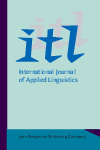
ITL-International Journal of Applied Linguistics
Exploring the dynamic intersection of language and pedagogy.ITL-International Journal of Applied Linguistics, published by JOHN BENJAMINS PUBLISHING CO in Belgium, stands as a leading journal in the field of applied linguistics and education, recognized for its rigorous scholarship and impactful contributions. With an impressive ranking of Q1 in both the Education and Linguistics and Language categories, ITL holds its place among the top journals globally, featuring in the Scopus rankings with a notable 91st percentile in both Arts and Humanities as well as Social Sciences. The journal aims to disseminate innovative research exploring the intersection of linguistics, language acquisition, and pedagogical practices, fostering a rich academic dialogue among researchers, educators, and practitioners. Though not currently an open access journal, ITL remains accessible to a broad readership, with an emphasis on high-quality, peer-reviewed articles that inform and inspire advancements in applied linguistics. The journal's commitment to academic excellence and relevance makes it an essential resource for those seeking to understand and contribute to the dynamic landscape of language studies.